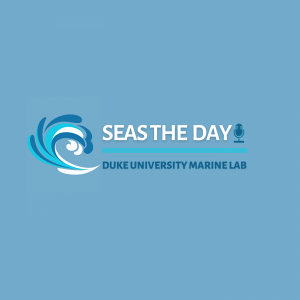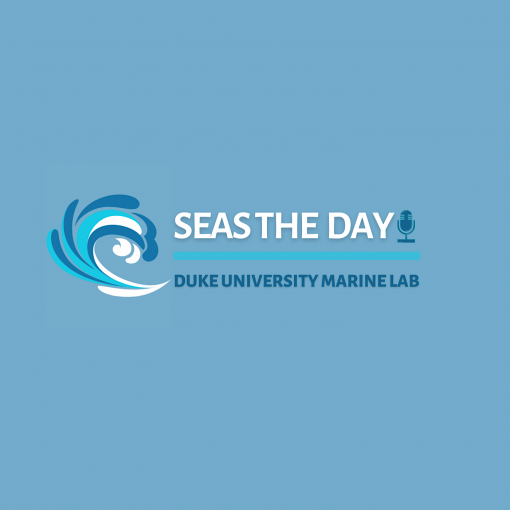Deep-sea mining is a topic of hot debate as groups argue over whether it will be good or bad for the countries where deep sea resources are found. On this episode, Masha Edmondson and Brandon Gertz explore the risks, rewards, and resistance deep-sea mining has sparked in three pacific island nations: Papua New Guinea, the Cook Islands, and Fiji. Along the way, deep sea experts Dr. Cindy van Dover and Ph.D. student Elisabetta Menini from Duke University help explain the environmental and human impacts of deep-sea mining and the actions that can be taken to avoid them.
Listen Now
Episode Hosts
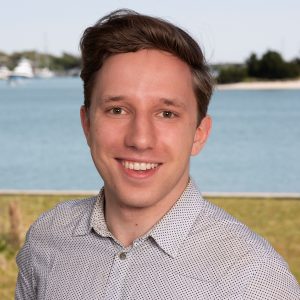
Brandon Gertz is a second-year Coastal Environmental Management Master’s Student at the Duke University Marine Lab. His work is focused on helping people appreciate and connect to the deep ocean, and his Master’s Project helped identify companies with possible future connections to deep-sea mining. Brandon has also supported Seas the Day’s Whale Pod series as an editor and was excited by the chance to record this time!
Twitter: @BrandonGertz1
Linkedin: https://www.linkedin.com/in/brandon-gertz-1b597b138/
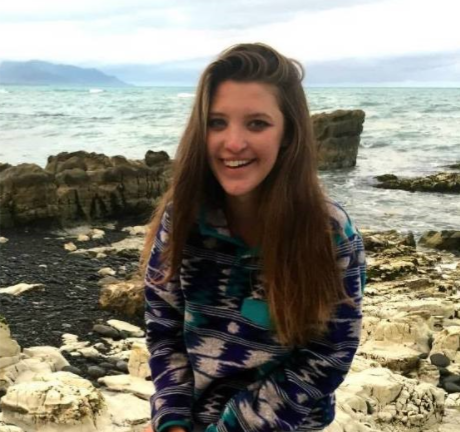
Masha Edmondson is a second-year Master of Coastal Environmental Management student at the Nicholas School, where she focuses on how the use of unoccupied aerial systems can improve scientific accuracy in understanding and predicting cetacean behavior advised by Dr. Dave Johnston. She also works with the Marine Geospatial Ecology Lab on research and communication about marine spatial planning on the high seas, the blue economy, marine mammals, and ecological and biologically significant areas (EBSAs). She will use the skills gained in her master’s program throughout her career in marine conservation.
Interviewees
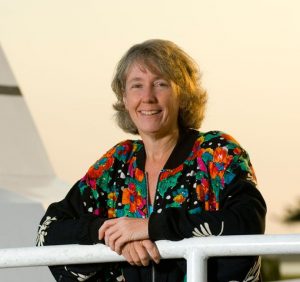
Cindy Van Dover, Harvey W. Smith Professor of Biological Oceanography and Director of Graduate Studies, Marine Science & Conservation
Dr. Van Dover is a deep-sea biologist with an interest in ocean exploration and the ecology of chemosynthetic ecosystems. She began her work in this field in 1982, joining the first biological expedition to hydrothermal vents on the East Pacific Rise. On receiving her Ph.D. in 1989, Van Dover joined the group that operates the deep-diving submersible ALVIN. She qualified as pilot in 1990 and was pilot-in-command of 48 dives. Her current research focuses primarily on the study of biodiversity, biogeography, and connectivity of invertebrates from chemosynthetic ecosystems and invertebrate functional anatomy. in addition, she is active in developing pre-industrialization policy and management strategies for deep-sea resources. She is currently the Harvey W Smith Distinguished Professor of Biological Oceanography and Chair of the Division of Marine Science and Conservation at Duke University.
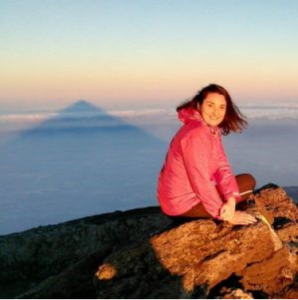
Twitter: @BettaMenini
YouTube: With Betta is Better
Series Host
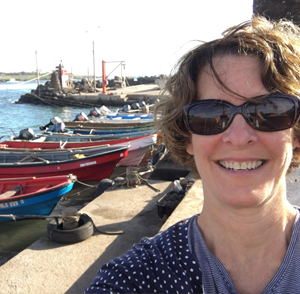
Dr. Lisa Campbell hosts the Conservation and Development series. The series showcases the work of students who produce podcasts as part of their term projects. Lisa introduced a podcast assignment after 16 years of teaching, in an effort to direct student energy and effort to a project that would enjoy a wider audience.
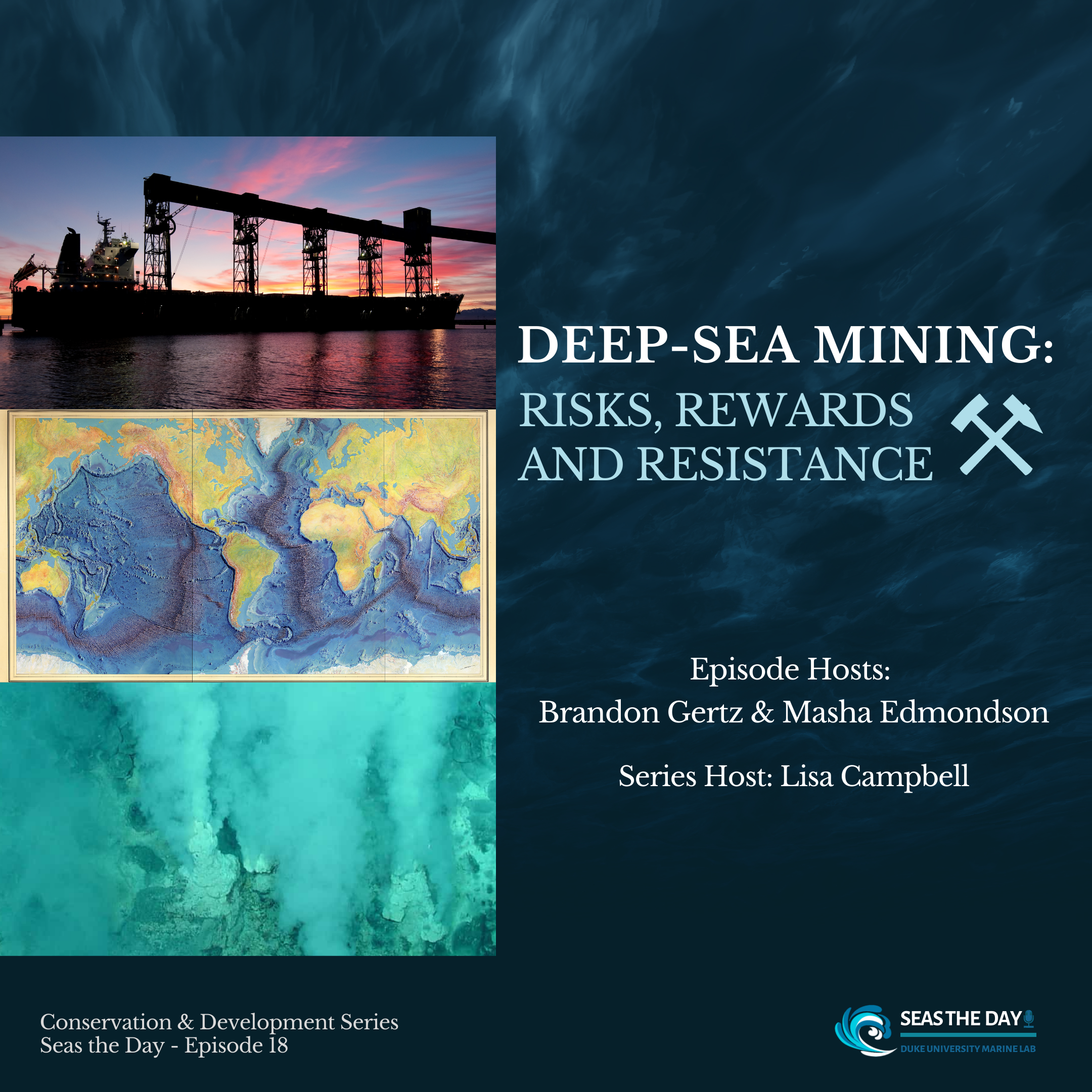
Supplemental material for this episode
(Oyster Waltz by Joe Morton plays)
Lisa Campbell: Welcome to Seas the Day, a podcast from the Duke University Marine Lab. I’m Lisa Campbell, and we are back again with an episode from our Conservation and Development series.In this episode, Masha Edmondson and Brandon Gertz dive into to the world of deep sea mining. Although deep sea mining is more of an aspiration than reality at the moment, that could change in the near future, as technological advances, mineral prices, and regulatory frameworks shift and evolve. Masha and Brandon focus on the possibilities for deep sea mining in three Pacific island nations, where deep sea minerals exist, but where the risks, rewards and resistance associated with mining have played out differently. As they take you across the Pacific and to the bottom of the ocean, Masha and Brandon speak to deep sea explorer and researcher Professor Cindy van Dover, and PhD student Betta Menini to learn more. I’ll turn it over to Brandon and Masha now.
BG: Imagine that you are standing at the very bottom of the ocean. It’s pitch black all around you. The light of the sun doesn’t reach you here: it’s smothered by the mass of water pressing down from above. Four empire state buildings could be stacked on top of you without breaking the surface. It’s a completely different world down here. As you switch on your flashlight, you’re treated to an incredible view. An octopus with wings floats past, seeming to fly through the still water. Nearby, a herd of squishy pink animals with tube feet shuffles through the silt looking for food. Through it all, everything is strangely quiet. Until suddenly, it’s not. BG: In the distance, you hear a small humming noise. It gradually builds, growing stronger until it becomes a screaming, grinding sound, blocking everything else out. Suddenly, it comes into view: a plume of dust rising hundreds of feet above the seabed. And at the base, a monster. But not one with fins or scales. This monster is made of metal. It trundles across the seafloor, sucking everything in its path into its steely jaws. Why is this strange machine here, in this deep, remote place? It’s not science fiction. It’s because of a process called deep-sea mining, and it could happen sooner than you might think. My name is Brandon Gertz,
-intro ourselves- [1:50]
ME: And mine is Masha Edmondson, and today we’re going to talk about this strange world of deep-sea mining. It hasn’t happened yet, but miners are exploring resources in the deep sea now. It’s a topic of hot debate as groups argue over whether deep-sea mining will be good or bad for the island countries where deep sea resources are found. In this podcast, we’ll be looking at the debate about deep-sea mining – the risks, rewards, and the resistance mining has sparked. While companies are also making plans to mine in international waters, we’ll be focusing specifically on the risks, rewards and resistance in three Pacific Island Nations: Papua New Guinea, the Cook Islands, and Fiji. As we go, we’ll be talking to deep sea experts Dr. Cindy van Dover and Ph.D. student Elisabetta Menini about the environmental and human impacts of deep-sea mining, and the actions that can be taken to avoid them.
(Investigation Piano by Furbyguy plays)
[explain SIDS – 2:52]
ME: Over two thirds of the world’s surface is covered by water. On a globe, the ocean can look like a solid block of blue, interrupted only by continents. But if you look closely, you may be able to make out tiny dots among the blue. Those are small island nations dispersed across the Caribbean, the Atlantic, the Indian and the Pacific Ocean. Many are recognized by the United Nations as Small Island Developing States, a distinct group to facilitate international collaboration. Right now, these states have become one of the main focal points of plans to mine the deep sea. There are two reasons why. The first is the unique economic struggle that island nations have to deal with. This is due in large part to their remote geography. Island nations can be thousands of miles from the nearest continent, which makes goods more expensive, income sources like tourism harder to come by, and environmental disasters harder to recover from (UN 2020) which makes island nations more vulnerable to economic struggles. This makes any opportunity to boost the economy, like mining deep-sea minerals, more appealing (Salpin et al. 2018).
BG: The other reason island nations have become a focus of deep-sea mining interest has to do with a feature of international law. Every coastal country has rights to an area of the water around it called an Exclusive Economic Zone. This zone was defined in the United Nations Convention on the Law of the Sea in 1982 (Thompson et al. 2018). It says that coastal states have full, exclusive control over the economic use of the ocean on their coast for 200 Nautical miles. That’s a pretty big space! If you drove a boat across the ocean at 60 miles an hour, it would take you 4 hours and 20 minutes to get from the beach to international waters.
BG: Here’s where that feature comes in. With small island states, these spaces get even more impressive. That 200 nautical miles of control doesn’t just extend from one coast, but surrounds the island. To make matters more extreme, many nations in the Pacific are made up of more than one island, and the zone extends from each one. With a little geometry, you can probably imagine just how those numbers stack up compared to the exclusive economic zones of countries based on a continent. The area of the exclusive economic zone for a country with a long coast line, like Argentina, is less than half of its land area. An island state like the Cook Islands, which we’ll talk about later, has a land area smaller than New York City. Its Exclusive Economic Zone, though, is over 700,000 square miles: over 12 times the area of the state of New York (Marineregions.org).
ME: With that much space to work with, you might guess that at least some of those island nations have valuable resources in their exclusive economic zones, including mineral ones. That’s true, and mining companies have been especially interested in resources that are controlled by island countries in the Pacific Ocean. It’s these Pacific Island Nations that will be most exposed to the risks, rewards, and resistance that deep-sea mining brings.
[Explain DSM – 6:11]
BG: So what is deep-sea mining, exactly? We asked Dr. Cindy Van Dover, a professor at Duke University who specializes in deep ocean science, to help us understand.
CVD [6:23-7:20]: The emergent mining interest are focused in the deepest waters on the polymetallic sulfides, hot springs, hot springs of two varieties: active where the fluid is coming out and inactive where they go inactive that may be a more suitable place to look for the metals copper, iron, zinc, in those sulfides. The biggest areas are the manganese nodules fields. Those manganese nodules have manganese but also have cobalt and nickel. The manganese nodules you know they are the little potatoes on the seafloor. So it looks like they just lie right on the surface of the mud in sometimes very very high densities where they are almost touching one another. That’s pretty extraordinary that these metals are just lying there to be harvested as the miners like to call it. And then the third resource is the cobalt crusts, which occur polymetallic crusts which occur often on seamounts and other flat high relief regions of the seafloor where the currents bring a lot of minerals and metals to precipitate on the rocks.
BG: And how are these resources going to be mined?
CVD [7:25-8:15]: well we don’t know yet. We have some ideas. There is a company called Nautilus minerals that developed three mining tools that would work on the seafloor in remotely operated vehicles and they would grind up the sulfides, gather it up into piles, stock piles, and then gather it up through riser pipes to a surface ship, and then the surface ship would dewater that material and then move the minerals or onto a big ship back to the coast. For manganese nodules, there are different kinds of designs trying to minimize the sediment plumes that could be created that would just uh, skim along the surface of the sediment and pick up the nodules and leave most of the sediment behind and again pump them up through a riser pipe. For cobalt crusts, I assume it has to be a grinding tool of some sort, and I don’t know that much about the prototypes.
BG: Elisabetta Menini is a current Ph.D. student specializing in deep ocean issues, also at Duke University. She helped us understand why these mining companies are turning their attention to the deep sea.
EM [8:26-9:24] On land we are finishing the good quality mineral… rocks that have minerals in it. So pretty much the percentages of copper and the percentages of cobalt and manganese or iron that are in our land reserve, they are in a minor percentage than what we had 100 years ago. Also procedure to, like, take them out, it’s I guess it changed, like it’s more difficult, more expensive. They are trying to find a way to save money. One of the things that they can do is to take the minerals… the type of minerals that are in the deep sea, uh, they started to analyze, and I know in the 50s or in the 70s when they started to explore the deep ocean, and they started to understand ‘ooh, we can use this!’” Deep seabed mining, that’s why we are talking about that.
ME: That explains what miners are looking for. The idea is for a mining company to get an island state to agree to let it mine in its waters, through a contract or lease. Then, when the goods are sold and the business is taxed, for example, both sides benefit. But if there’s so much potential, why aren’t deep-sea mining products on store shelves right now? The truth is that no countries or companies have managed to mine the deep ocean for profit yet. It’s a new and risky industry. And where they’ve tried, there have sometimes been serious consequences for the companies and countries involved. Those difficulties are what we mean when we say we’re exploring the risk of deep-sea mining. And that theme of risk will take us to Papua New Guinea.
[PNG: Risk – 10:18]
ME: Papua New Guinea is a Pacific Island Nation North of Australia. Like many small island developing states, it isn’t wealthy: According to the United Nations, the average person in Papua New Guinea earns less than $2,000 per year. Over a third of the population is in poverty (UNDP). Even so, Papua New Guinea’s economy has been getting stronger since 2010. That’s mainly because it’s been boosting its exports of natural resources (UNDP). Those natural resources include things like petroleum gas. But they also include minerals like gold and copper (Observatory of Economic Complexity).
ME: You might have already guessed what comes next. Trying to boost its economy further, Papua New Guinea decided to take a risk. In 2011, it made a deal with a company called Nautilus Minerals. Nautilus wanted to become the first in the world to successfully mine and sell minerals from the deep ocean (Hylton 2020). The plan was this: Papua New Guinea would give Nautilus permission to mine for copper, gold, and zinc in the deep ocean along its coast (Hunter, T. and Madeline, T. 2014). If the project worked and Nautilus was able to sell the metals it collected, the country would earn 15% of the profits (Business Advantage PNG). As with any gamble, Papua New Guinea had to buy in for a chance to earn. The cost of that investment? 120 million dollars out of the government treasury (Doherty 2019). If the risk had paid off, the chance Papua New Guinea took on the brand new deep-sea mining industry would have been worth it. Instead, everything started falling apart.
ME: Marine scientists warned about the potential for the project to damage some of the rarest marine environments on Earth (Cuyvers et al. 2018). Because deep sea environments have high levels of endemism, unique and fascinating animals like giant tubeworms, sulfur eating mussels, and at least 20 entirely new species were threatened by the project (EJAtlas 2020). And marine scientists weren’t the only ones raising alarms. Coastal indigenous peoples also protested the project. They emphasized concerns about environmental impacts as well as their own spiritual connections to the ocean (Roche, C. and Bice, S. 2013). We’ll tell you more about environmental consequences of deep-sea mining later in the episode. The point here, is that the environmental risk became a liability: Investors of Nautilus Minerals, concerned about the project’s cost and risk to their reputation, pulled out (Hume 2018). The shipyard that had been building Nautilus’s collection vessel sold it to another buyer because Nautilus couldn’t afford it (Hutt 2018). Finally, Nautilus Minerals went bankrupt, and the project was shut down (Doherty 2019). The government of Papua New Guinea lost its investment: the $120 million dollars risk had no return nothing (Doherty 2019).
ME: This case in Papua New Guinea emphasizes just how risky deep-sea mining investments can be. Even after this failure in Papua New Guinea, though, multiple other Pacific Island Nations are considering opening up mining exploration to companies in their waters. So why are countries still willing to take the risk? The answer has to do with the other side of the calculation: The potential reward. To understand the rewards that Pacific Island Nations are still hoping to get from deep-sea mining, we’ll be traveling over 3,000 miles East across the Pacific, to the Cook Islands.
[Cook Islands: Reward – 13:39]
BG: The Cook Islands are a scattered network of small islands in the Western Pacific. We mentioned at the start of the show that these 15 islands together contain less land area than New York City. The most striking feature of these islands, though, is their distance from one another. Because they’re so spread out, the Cook Islands can hypothetically take full advantage of international law on Exclusive Economic Zone size. It effectively means that less than 1% of the Cook Islands’ territory is on land. Numbers like these have led to calls by leaders of some island nations to refer to their countries not as small island states, but as large ocean states (Jumeau 2013).
BG: What does that mean for deep-sea mining? It means that the Cook Islands, with fewer than 18,000 people and a GDP of 300 million US dollars, officially controls all access to 10 billion tons of deep-sea minerals. These minerals could hypothetically earn tens of billions of dollars for the Cook Islands and other nations in similar positions (Neate 2013).
BG: That kind of reward is hard to pass up. Unlike Papua New Guinea, the Cook Islands have few natural resources on land that its citizens can harvest and sell. The Cook Islands doesn’t even have a government authority responsible for mining on land (Kakee, Tomoko). Most of their income today is tied to tourism and fishing (CIA World Factbook). All this makes the idea of strengthening the Cook Islands’ economy by selling deep-sea mining permits very attractive.
BG: While there are those against it, the Cook Islands have made major strides toward getting deep-sea mining started. They’ve passed new legislative acts that create frameworks for planning and designating areas for mining activities. They’ve also established a Seabed Minerals Authority.
BG: Prime Minister Mark Brown says that the Cook Islands government is trying to balance environmental conservation with economic development. All mining legislation must work within the boundaries set by environmental laws (Marae Moana Act 2017) created to protect marine areas (Kung 2019). By enacting a policy framework that takes into consideration the environmental risk of deep-sea mining, the Cook Islands is hoping to avoid some of the risks, while focusing on the economic rewards of mining. By diversifying the economy, the Cook Islands plans to reduce its economic vulnerability (Dateline Pacific 2020). That may now be an even bigger priority given the global pandemic impacting tourism, which is usually the driver of over half of the Cook Islands’ economy (Cook Islands Tourism Corporation 2016).
BG: It’s not just the government supporting deep-sea mining. A study by Petterson and Tawake in Ocean and Coastal Management showed that most local Cook Islands stakeholders, including traditional and religious leaders, are not against allowing mining in their country’s waters (Petterson, M., and Tawake, S., 2019). That’s different from Papua New Guinea, where firm local resistance helped derail the plans of Nautilus Minerals. Even the opposition party of the Cook Islands, which used to support a 10-year ban, switched its position in 2021 (Samoglou 2021). In its statement, the party acknowledged the possible benefits of deep-sea mining to the Cook Islands economy (Samoglou 2021). For now, the Cook Islands seem to believe that the potential reward is worth the risk.
[Environmental Impact – 17:04]
ME: Many scientists and other Pacific Island nations have been less willing to make that conclusion, often based on environmental concerns. So before we get to our third case in Fiji, it’s important to consider those potential impacts on ocean ecosystems and the people who depend on them.
CVD [17:22-17:30] We have to understand what the implications are, environmental implications are, whether or not it does happen because there is the potential that it could happen.
ME: Dr. Cindy Van Dover has spent her career researching life at the bottom of the ocean. She was the first woman pilot of the submersible ALVIN (Human Occupied Underwater Vessel) and has taken trips to explore the deep sea in person.
(Ambient Documentary by Tyops plays)
CVD [17:46-19:11] I was really lucky on my very first dive to the rose garden hydrothermal vents on the Galapagos spreading center, and this is kinda of now the historic site, back in 1985, I hate to admit, tubeworms, we landed right smack dab in the middle of, on the edge of a field of tubeworms and giant tubeworms they can be as tall as me, and they are about oh I don’t know an inch or so in diameter, a couple centimeters in diameter, um they had bright red plumes white tubes that gather together in clusters like a bouquet of roses it is really extraordinary and the water is incredibly clear, you might think oh my gosh you can’t see anything in the deep sea, but when you turn on the lights when you are a mile and half down the water is crystal clear and so these animals the contrast of the white tubes, the red plumes, and black basalt because you are on 0 H crust it is the youngest rock on the planet, right apart from a volcanic eruption, it just boggled my mind that this could all be down there and we just never knew about it. I mean it was just, I felt so privileged to see that world and its not just the tubeworms its things crawling all over them. Strange I mean curious looking fish that just kind of lie like a kitten in a basket among the tubeworms, I don’t know it was just a remarkable things that I never expected to see. It is a wild and beautiful and strange place. In the best way. I was like “Oh my gosh what is going on down here, I want to understand more,” why, you know cause they are oasis of life on the seafloor and why should they be? And even at that time, in the mid 80s we were just getting to understand what is going on in these areas. Yeah, just a very special place.
ME: We asked Dr. Van Dover about the impact mining may have on deep-sea ecosystems.
CVD [19:18- 20:27] :The scientific community and environmental managers are keen to understand where that plume goes and how much of an impact it might have, it’s I think it, the important thing is that the plume will be larger than the area disturbed by the mining tool for these manganese nodules, and then the plume, depending on some fall out the particles will fall out, sediment will fall out, and so has the potential to bury organisms, it has the potential to bring stored carbon into the water column where it can be remineralized into CO2 and other materials, and um I think there is concern about in the near field where the sediment plume is dense that there would be masking of bioluminescent signals perhaps clogging of filter feeding mechanisms, um so there is a lot of different things to tackle if you are thinking about environmental impact assessments and going out to do some preliminary experiments to see what the effects are, um it is pretty intensive observational, trying to just understand even the plume dynamics of a simple disturbance on the seafloor and given the quality of this type of sediment that is down there.
CVD [20:28-21:08]: But lets take the sulfides first, I think that there is um, the sulfides probably have a, as I understand it a greater chance that if the fine sulfides get into the water column that could be picked up by organisms. For the crusts and for the manganese nodules, especially picture the crusts that they have crusts on seamounts often have very old long lived corals and all the invertebrates and organisms associated with those corals, and so if you were to mow those down it is not clear, how long it would take for them to recover [glitch in audio] we have a science in ecology in the deep sea at all it is [idk how spell this word] to not exist, and um, yes so recovery is a question on those crusts. How would you ever get things to come back? How long will they be gone? For the corals on the seamounts we are talking hundreds to centuries to longer.
ME: Dr. Van Dover also told us that deep-sea mining impacts may bring potential concerns for humans on the surface too.
CVD [21:16-21:37]: I think there is potential for insidious effects that will go undetected until it is too late. And that would be shame on you shame on us for not having tried to figure out what those things are. And we are trying, but some of it is we don’t know which questions to ask. We don’t know what we don’t know part of that.
ME: These environmental and human concerns are very important to some Pacific Island Nations. While Cook Islands stakeholders generally support mining exploration for the economic rewards it may bring, others have decided to oppose the process. That brings us to our third and final theme of today’s episode: resistance.
[Fiji: Resistance- 21:57]
ME: Earlier, we talked about the risks of deep-sea mining with Papua New Guinea, and why countries like the Cook Islands are continuing to explore this option for economic rewards, but now we will dive into why some islands, like Fiji, are resisting deep sea mining all together.
ME: Although classified as a developing country, Fiji is one of the most economically developed countries in the South Pacific with 5.4 billion USD GDP, and it is also one of the most attractive for tourists and travelers. Tourists come from all around the world to experience natural environments such as lush rain forests, warm sandy beaches with crystal clear waters, and vibrant coral reefs teeming with life just about everywhere you look.
ME: Fiji is also rich in mineral resources. They have large seafloor sulfides and high deposits of copper, gold, silver, and zinc making it the ideal spot for deep-sea mining. So why are they against it? Well, in the past, Fiji actually permitted exploration licenses for deep-sea mining within its exclusive economic zone with investments from the European Union to explore for minerals (AGTD 2015). It wasn’t until it was made public that these licenses were close to key reefs and fishery resources (WWF 2016), that it started to raise concerns. As communities and environmental organizations begun to sound the alarm, the government of Fiji decided to listen.
ME: A report by the World Wildlife Fund (in 2016) found that the Fijian economy would not get the greatest benefit of deep-sea mining within its own exclusive economic zone (WWF 2016). Similar to the promises of economic and social prosperity for the Pacific people from land-based mining efforts, the Secretary General of Pacific Conference of Churches stated, quote “our lived experiences in the Pacific show clearly that powerful corporations benefit the most while it is our people who bear the costs of destruction of our natural environment” unquote (RNZ 2021). Instead, most benefits would go to international stakeholders. And “international” is what deep sea mining companies are. Nautilus Minerals, the company that failed to get deep-sea mining started in Papua New Guinea, was based in Canada. Two of the most important companies that are working with Pacific Island Nations to mine the deep sea right now are called DeepGreen Metals and DEME. DEME is based in Belgium, while DeepGreen, like Nautilus, is registered in Canada (DeepGreen Metals; DEME). No company planning on deep-sea mining is based in the Pacific Island Nation whose waters they’ll be mining in. Many of those mining companies have more money than entire Pacific Island governments, which can give them the power to decide who gets to profit from mining (Petterson, M., and Tawake, S., 2019). That power imbalance could be a big problem for Pacific Island Nations, as it has been in the past (RNZ 2021). That lack of a fair economic reward led Fiji to focus on the environmental, social and economic costs of deep-sea mining, and to emphasize resistance.
ME: The Prime Minister of Fiji, Josaia Bainimarama, has officially recognized the need for robust research and environmental protections before any deep-sea mining occurs in Fiji’s waters (Prime Minister Frank Bainimarama 2019). He accredited this to the majority of Fijians relying economically on the ecosystems services and tourism provided by their marine environments. Many indigenous communities rely on the ocean, and similar to Papua New Guinea, they are also concerned about the potential for deep-sea mining to degrade and devalue their ancestral connection to the ocean. This could lead to marginalization, disenfranchisement, and may threaten their food security (Roche, C. and Bice, S. 2013).
ME: Another potential major cost of mining is the economic impact to tourism (WWF 2016). Tourism is of special note here, and not just because it’s Fiji’s biggest industry, worth 891 million USD annually (as of 2018): A 2016 survey conducted by Griffith University asked 102 tourists how likely they were to return to Fiji based on their experience. Answers were typically positive, 85% of the tourists said they would return based on their time snorkeling, diving, and relaxing on the beach. The last question on the survey, asked whether tourists would still be willing to come back if Fiji allowed deep-sea mining in its waters. The numbers dropped: 56% of people said they would not return if mining occurred and 62% of the tourists surveyed believed that the overall experience of the coral reef would be ‘a lot worse’ (Folkersen 2018). The impacts on annual GDP could be significant. Even a 1% decline in dive tourism visitation would result in an economic loss of 1.3 million US dollars per year (WWF 2016). Given that it’s unclear what the economic value of DSM would be, and due to the collapse of Nautilus Minerals we talked about earlier, Fiji decided that deep-sea mining wasn’t worth the risk. At the Pacific Islands Forum in 2019, Prime Minister Josaia Bainimarama called for a 10-year moratorium on deep-sea mining (Doherty 2019).
[Summary & Mitigation Measures – 27:15]
BG: Clearly, there are stark differences between Pacific Island Nations’ responses to the risks and rewards of deep-sea mining. Papua New Guinea took the risk of being first, and failure there served as cautionary tale for neighbor islands. Some, like the Cook Islands, have decided that with a policy framework to guide the process, the possible reward to their economy is still worth the risk. Others, like Fiji, have chosen resistance. In 2021, Pacific civil society organizations called for a global ban on deep sea mining, highlighting that Pacific peoples had quote “a moral obligation to protect it against exploitation and destruction” unquote. The leader of the Pacific Network on Globalization stated, quote “scientists have given clear warnings about damage to oceans and the link to climate change” unquote (RNZ 2021). These different approaches to deep-sea mining may cause conflict between these island states. If some states realize an economic benefit from deep-sea mining while others do not, wealth gaps could be created, and environmental damage might spill over from mining to non-mining nations. People and ecosystems could be hurt. So how can we approach these problems? We asked Elisabetta Menini and Dr. Van Dover for their thoughts.
EM [28:43-30:43]: In terms of regulatory and management measures, there are area-based management tools, so there are marine protected areas that are right now under consideration at least in ABNJ. At national level it is up to the nation that has the mineral resource within their exclusive economic zone. To put in place some area-based management tools such as MPAs. Area-based management tools that can protect the environment in a way that they can be representative of their surroundings. So what an MPA or an area-based management tool should do, it would be to represent the environment enough to contain enough distance for maintaining the genetic connectivity between the same type of environment in that area of the ocean. As well as being big enough to not get the, like, plume, or anything, it could be like detritus, or the slurry or something, that can come up from the actual extraction of minerals when it will start happening. That is one of the solutions that we can do now, and that is what I am studying now. In terms of how technology can help this, I cannot arrive at that level of details to understand what is possible and what is not possible. All the engineers that I’ve talked to so far, they say ‘everything is possible if we have the money to do it! You just have to tell me what I can or what I cannot do and I can make it for you, you just have to give me the money for it.’ So it really depends on how much investment there is on technology and how much communication there is between biologists and engineers.
CVD [30:44- 31:47]: 30: There are so many levels on which to answer that so spatial planning and protected areas is certainly important and that is Betta’s interest and expertise, I think it depends on what impacts you are concerned about. So if you are concerned about noise then you think about how to mitigate noise impacts or how much will you allow for your conservation objective or environmental management objective. What is allowable? So noise. The plumes, how much of the plumes can you allow and there are ways to encourage the contractors if they are permitted to mine to minimize that plume or plume impact through modifications of the mining plan or modifications of the vehicle, vehicle design, how the vehicle moves over the seafloor, how fast it moves, where it moves, when it moves. If you are concerned about marine mammal migration and the noise that shipping is going to make then you think about how do you time your mining activities and the noise so it doesn’t interfere with migration routes. I mean it involves every kind of scientists you can think of to address ways to mitigate some of these environmental impacts. If mining is permitted, it is certainly not going to be just spatial planning, that is not the only mitigation effort that is going to take place.
BG: Due to the recent interest in deep-sea mining in national and international waters, other researchers are proposing some solutions to reduce seabed mining impacts. Researchers from the University of Exter offer three ideas. The first is banning all seabed mining where the social and environmental costs are calculated to exceed potential benefits. This can be done through cost benefit analysis and studies of which uses of the ocean can coexist in the same place. Second, creating a fund based on mining profits to cover research, monitoring, and disaster compensation could help cover the costs of deep-sea research. In the event of a disaster, that would also ensure that money is available to make sure that Pacific Island Nations aren’t forced into debt. Lastly, the researchers recommend working toward a circular global economy (Thompson et al 2018). That basically means that in the future, we should do a better job of recycling and reusing the resources we already have so that we don’t need to dig up more. Key points of that idea include extending product lifespans, reducing overconsumption of technology, and giving countries the tools they need to recycle metals. This would help limit the need for minerals extracted from the environment, including the deep sea.
(Ambient Documentary by Tyops plays)
ME [33:22-34:06]: On today’s episode, we’ve talked about the risks, rewards, and resistance that Pacific Island nations are faced with due to future deep-sea mining. As interest in mining continues to grow, it is important to remember the damage deep-sea mining can cause to the ocean and the people who depend on it. There are no easy answers to this problem. But there are tools available to help Pacific Island Nations make the best, most informed decisions they can for their economies, their cultures, and the health of their oceans. As plans on all sides move forward, making sure those tools are used as often and as effectively as possible should be a priority everyone can agree on. Thanks for listening.
Lisa Campbell: You’ve been listening to Seas the Day. To learn more about deep sea mining, visit the episode page on our website at www.sites.nicholas.duke.edu/seastheday. Today’s episode was written and produced by Masha Edmondson and Brandon Gertz. Final editing was done by Brandon Gertz. Our theme music was written and recorded by Joe Morton. Our artwork is by Stephanie Hillsgrove. Follow us on Instagram and Twitter @seasthedaypod. And if you enjoyed this episode, please leave us a rating in Apple podcasts, and recommend us to your podcast listening friends.
(Oyster Waltz by Joe Morton plays)
Music sources:
tyops, “Ambient Documentary” https://freesound.org/people/tyops/sounds/455174/ Used under attribution license
Furbyguy, “Investigation Piano” https://freesound.org/people/furbyguy/sounds/365025/ Used under creative commons 0 license
Academic sources:
Applied Geoscience and Technology Division (AGTD), Secretariat of the Pacific Community. “SPC-EU Deep Sea Minerals Project: Strengthening the management of deep sea minerals in the Pacific.” 2015. https://www.oceanfdn.org/sites/default/files/Deep+Sea+Minerals+Project.compressed.pdf
Business Advantage PNG. “Nautilus Minerals Looks Across the Pacific after Securing Papua New Guinea Undersea Mining Deal.” 2014. https://www.businessadvantagepng.com/nautilus-looks-across-pacific-securing-papua-new-guinea-undersea-mining-deal/#:~:text=Canadian%20mining%20company%20Nautilus%20Minerals,project%20in%20the%20Bismarck%20Sea.
Cook Islands Tourism Corporation. “Protecting our future: Cook Islands sustainable tourism development policy framework and goals.” 2016. https://policycookislands.files.wordpress.com/2017/05/2016_ci-sustainable-tourism-development-policy-framework-goals.pdf
Cuyvers, L.; Berry, W.; Gjerde, K.; Thiele, T.; and Wilhem, C. Deep seabed mining: a rising environmental challenge. 2018. IUCN. https://pdfs.semanticscholar.org/682c/bf5b0464e93fbac8b9c2043442e45473dada.pdf
Dateline Pacific. “Cook Islands invites seabed mineral exploration.” 2020. RNZ. https://www.rnz.co.nz/international/programmes/datelinepacific/audio/2018770986/cook-islands-invites-seabed-mineral-exploration
DeepGreen Metals Inc. “Company.” https://deep.green/company/
DEME. “GSR.” https://www.deme-gsr.com/
Doherty, Ben. “Collapse of PNG deep-sea mining venture sparks calls for moratorium.” 2019. The Guardian. https://www.theguardian.com/world/2019/sep/16/collapse-of-png-deep-sea-mining-venture-sparks-calls-for-moratorium
Environmental Justice Atlas. “Deep sea mining project Solwara 1 in the Bismarack Sea, Papua New Guinea.” 2020. https://ejatlas.org/conflict/deep-sea-mining-project-solwara-1-in-the-bismarck-sea-papua-new-guinea
Folkersen, M. V.; Fleming, C. M.; Hasan, Syezlin. “Deep sea mining’s future effects on the tourism industry: A contingent behaviour study.” 2018. Marine Policy 96: 81-89. https://doi.org/10.1016/j.marpol.2018.08.001
Hume, Neil. “Anglo American to Exit Stake in Deep Sea Mining Company.” 2018. Financial Times. https://www.ft.com/content/ad58aee6-4fad-11e8-a7a9-37318e776bab
Hunter, T. and Madeline, T. “Deep Sea Bed Mining in the South Pacific: A background paper.” 2014. University of Queensland. https://www.international-arbitration-attorney.com/wp-content/uploads/arbitrationDeep-Sea-Bed-Mining-in-the-South-Pacific.pdf
Hutt, David. “After the loss of a ship, deep sea mining plans for PNG founder.” 2018.
Hylton, W. S. “History’s largest mining operation is about to begin.” 2020. The Atlantic. https://www.theatlantic.com/magazine/archive/2020/01/20000-feet-under-the-sea/603040/
Jumeau, Ronny. “Small Island Developing States, Large Ocean States.” 2013. https://sustainabledevelopment.un.org/content/documents/1772Ambassador%20Jumeau_EGM%20Oceans%20FINAL.pdf
Kakee, Tomoko. “Deep-Sea Mining Legislation in Pacific Island Countries: From the Perspective of Public Participation in Approval Procedures.” 2020. Marine Policy 117: 103881. https://doi.org/10.1016/j.marpol.2020.103881.
Kung, A. Review of the draft Seabed Minerals Bill (Cook Islands). 2019. Centre for Social Responsibility in Mining, Sustainable Minerals Institute, The University of Queensland: Brisbane.
Lodge, Michael. The International Seabed Authority and Deep Seabed Mining. 2016. United Nations Chronicle. https://www.un.org/en/chronicle/article/international-seabed-authority-and-deep-seabed-mining
Marineregions.org. “Marine Gazeteer Place Details.” https://www.marineregions.org/gazetteer.php?p=details&id=8464 https://www.marineregions.org/gazetteer.php?p=details&id=8446
Neate, Rupert. “Seabed mining could earn Cook Islands ‘tens of billions of dollars’.” 2013. https://www.theguardian.com/business/2013/aug/05/seabed-mining-cook-islands-billions
Observatory of Economic Complexity. “Papua New Guinea.” https://oec.world/en/profile/country/png/
Petterson, M.G., and Tawake “The Cook Islands (South Pacific) experience in governance of seabed manganese nodule mining.” 2019. Ocean and Coastal Management 167: 271-287. https://doi.org/10.1016/j.ocecoaman.2018.09.010
Prime Minister Frank Bainimarama. 50th Meeting of the Pacific Island Forum, Tuvalu 2019.
RNZ. “Pacific calls for global ban on deep sea mining.” 2021. Retrieved from https://www.cookislandsnews.com/regional/pacific-islands/pacific-call-for-global-ban-on-deep-sea-mining/
Roche, C. and Bice, S. “Anticipating Social and Community Impacts of Deep Sea Mining.” 2013. Deep Sea Mineral and the Green Economy. https://www.researchgate.net/publication/333608904_Anticipating_Social_and_Community_Impacts_of_Deep_Sea_Mining
Salpin, C.; Onwuasoanya, V.; Bourrel, M; and Swaddling, A. Marine scientific research in Pacific Small Island Developing States. 2018. Marine Policy 95: 363-371. https://www-sciencedirect-com.proxy.lib.duke.edu/science/article/pii/S0308597X16304730?casa_token=JoB8aNHOpKgAAAAA:5u1l9hQ2O6A2K6hSwCiwmeD_nVeR6Cz86H5ji56tDN3zeqt9TGXHYzmZ9Ce2xlaVvuYGwoT3qQ
Samoglou, Emmanuel. “Demos reject calls for decade-long ban on seabed mining in policy flip.” 2021. Cook Islands News. https://www.cookislandsnews.com/national/environment/demos-reject-calls-for-decade-long-ban-on-seabed-mining-in-policy-flip/
Thompson, K. F.; Miller, K. A.; Currie, D.; Johnston, P.; and Santillo, D. Seabed Mining and Approaches to Governance of the Deep Seabed. 2018. Front. Mar. Sci. 5: 1-12. https://www.frontiersin.org/articles/10.3389/fmars.2018.00480/full
United Nations. “Small Island Developing States.” 2020. https://www.un.org/ohrlls/content/about-small-island-developing-states
United Nations Development Programme. “About Papua New Guinea.” https://www.pg.undp.org/content/papua_new_guinea/en/home/countryinfo.html
CIA World Factbook. “The Cook Islands.” https://www.cia.gov/the-world-factbook/countries/cook-islands/#:~:text=The%20Cook%20Islands’%20economy%20relies,institutions%2C%20and%20with%20enforcement%20measures.
WWF International. “Counting the potential cost of Deep Sea-bed Mining to Fiji.” 2016. https://wwfasia.awsassets.panda.org/downloads/deep_seabed_mining___economic_risks___final_1.pdf

